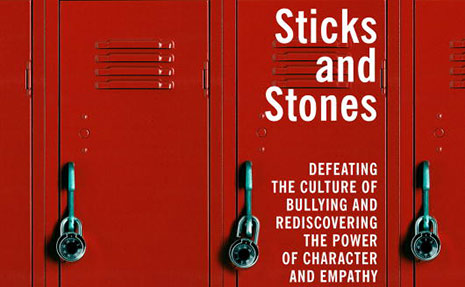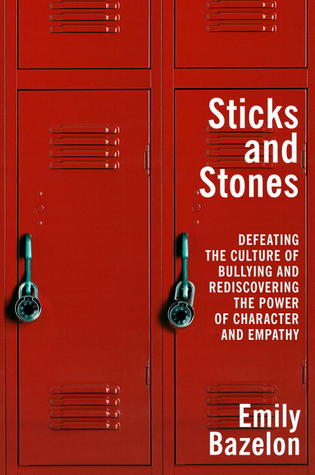Emily Bazelon began reading about the way young people treat each other online in the most apt location: the Internet. The mother of two adolescent sons, Bazelon was interested in how using technology to bully peers made the experience different for contemporary youth. She was deeply curious about how her own children’s lives were affected by bullying, and decided to write a book to aid a generation of parents who grew up without social media or texting.
Sticks and Stones: Defeating the Culture of Bullying and Rediscovering the Power of Character and Empathy chronicles Bazelon’s visits to homes, schools, and the office of social media giant Facebook to understand the new face of bullying. Her research identifies strategies to reduce the harmful practice in teens’ lives and promote a culture of empathy.
In this interview, Bazelon spoke with In The Fray about how the Internet has transformed bullying and why Americans have only recently begun addressing the problem in young people’s lives.
Although bullying has been around for centuries, how did the Internet create a new incarnation?
Prior to the Internet, if you were a target of bullying, you would get a break from the harassment when you came home from school. You had a chance to put yourself back together. The social media aspect of bullying can be really devastating because Facebook and Twitter make kids feel like bullying is happening 24/7. Also, there’s a sense that a lot of other kids are witnessing your humiliation, and that is really difficult for targeted kids to deal with.
Are all bullies the same?
There are different types of bullies. One type is physically dominating, the old-fashioned big kid who steals your lunch money. Another type is what we often think of as “mean girls” — though they can be boys also. These bullies use a particular kind of harmful aggression in order to score social points. They are mean to become more popular, and they’re often the hardest for adults to spot because they’re clever at manipulating people and disguising their behavior.
Then there are kids who are both bullies and victims. These kids tend to have the biggest emotional problems, and they all struggle socially. They end up doing the dirty work for the mean kind of bullies. It’s important to understand the distinctions and figure out which intervention makes the most sense for each kid.
How does bullying in the adult world affect adolescents?
Adults are modeling a culture of enormous conflict and aggression for kids. When they watch [characters on] Jersey Shore, and see the uncivil way people comment anonymously online, they learn people can be incredibly cruel. Kids absorb that from adult culture, and it makes it seem like it’s okay for them to talk and act in those same ways.
Why is it important to show that bullying isn’t just about victims versus offenders?
Almost all kids are capable of empathy, but kids who act like bullies are cutting themselves off from those feelings. I wanted to understand why this behavior is going on and what motivates it. It’s only when we understand kids’ detrimental behavior that we are able to help them stop doing harmful things.
A recent study shows that, twenty years after childhood, the people who were bullied, or people who were both bullies and victims, are more likely to have depression, anxiety disorders, and suicidal thinking. That is the best evidence we have of bullying having long-term, adverse psychological consequences, and it underscores the importance of taking this problem seriously.
Facebook has put various methods in place to oversee cyberbullying. Should they be doing more to regulate what is happening on social media?
I was struck by the enforcement challenges in addressing cyberbullying. For example, Facebook has a rule against bullying, but millions of complaints come in every week, and they have a relatively small staff to monitor those complaints. This raises questions about what Facebook’s responsibility is to enforce their own rules.
Also, Facebook cares a lot about building brand loyalty among teenagers and doesn’t want to do anything that’s seen as uncool. But it wouldn’t be that hard for them to have an early warning system, or even respond more quickly when schools complain.
What role do school administrators and teachers play in preventing bullying?
Schools can effectively reduce bullying if teachers and administrators take the issue on. Adults are really crucial and set the tone of the school. They can help kids by leading the way, setting a good example, and responding when they see bullying. We still have the problem of adults turning a blind eye.
The most important thing a school can do is figure out which problems are worth addressing and come up with a strategy. Isolating the problem makes it more manageable and allows the school to throw more resources toward the kids who are acting out.
The second step is giving kids the tools to regulate and express their emotions. Some families do this intuitively and don’t need a curriculum, but other families are doing less in this domain, and the schools have to figure out how to do more.
Susan M. Lee Susan M. Lee, previously In The Fray's culture editor, is a freelance researcher and writer based in Brooklyn. She also facilitates interviews for StoryCorps, a national oral history project. In her spare time, she maintains the blog Field Notes and Observations.
- Follow us on Twitter: @inthefray
- Comment on stories or like us on Facebook
- Subscribe to our free email newsletter
- Send us your writing, photography, or artwork
- Republish our Creative Commons-licensed content


